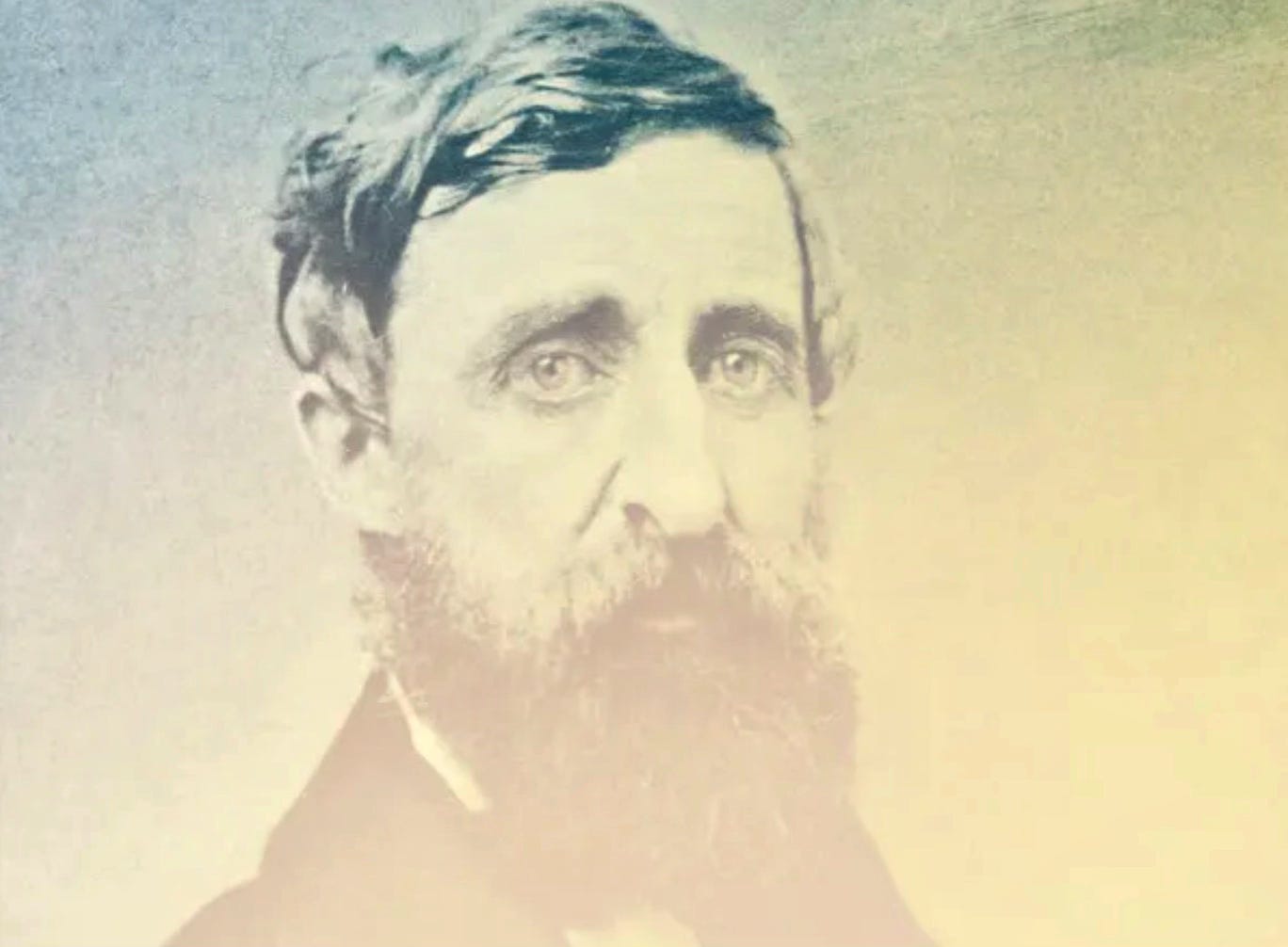Henry David Thoreau’s Principles For a Simple Life
On pursuing enjoyable means, not favorable ends
Hello everyone,
Postanly Weekly is a reader-supported smarter living newsletter. To support my work, you can upgrade to a paid subscription for $7 per month or $40 for an entire year. With a modest yearly contribution you’re not only helping keep Postanly Weekly going, you also get free access to thinking tools for life.
Summer discount: 40% off today(get free instant access to Thinking Toolbox (mental models for life) and Mental Wealth Toolbox
Henry David Thoreau’s Principles For a Simple Life
What is the simple but good life? This question has been asked by thinkers, poets, philosophers and laypeople alike for centuries. And it continues to be pondered in our modern world, particularly as technology seems to remove us from the simple pleasures of a life spent outdoors, among the trees and rolling hills of nature.
Instead of spending time with those we love or working toward a goal that can help us become better versions of ourselves, we are often trapped in the cycle of life that offers no real value to us. The principles of simplicity stem from a simple idea: less is more. In other words, as Thoreau famously said, if you can’t do more with less, you should simplify. While this is an abstract concept, there are several ways in which one can practice simplicity.
For example, while some people might advocate for a minimalistic lifestyle and spend less money to achieve financial security, others might choose to reduce their possessions because they don’t have the space to store everything they own.
Another way to practice simplicity is by simplifying your schedule and ensuring that everything you do is essential. The point is that there’s no need to complicate life when all you really need are a few things that make life meaningful.
One can reduce stress, be more environmentally conscious, and save money by choosing a simple lifestyle. Simplifying life also involves reducing distractions to focus more on important things in life. A simple life requires personal reflection and awareness of all aspects of life to determine what is most important to you.
Thoreau’s simple life experiment
Well-known American essayist and naturalist Henry David Thoreau tackled this question in his famous piece “On Living The Good Life”, which he wrote during his stay at Walden Pond in 1845. He spent two years living in a cabin on Walden Pond, and the experience has inspired many people to follow a simple, self-reliant lifestyle.
He wrote over two dozen books, most successfully Walden (1854), which describes his simple life in the woods of Concord, Massachusetts, and his experiments with self-reliance and simple living. He is well known for his resistance to materialism and conformity. Thoreau believed that the key to a simple life was simplicity itself. He believed that people should strive for simplicity, not necessarily for minimalism. He thought there was no point in striving for something that makes you miserable in the end.
“I went to the woods because I wished to live deliberately, to front only the essential facts of life, and see if I could not learn what it had to teach, and not, when I came to die, discover that I had not lived. I did not wish to live what was not life, living is so dear; nor did I wish to practise resignation, unless it was quite necessary. I wanted to live deep and suck out all the marrow of life, to live so sturdily and Spartan-like as to put to rout all that was not life, to cut a broad swath and shave close, to drive life into a corner, and reduce it to its lowest terms...” Thoreau said.
It’s easy to see why Henry David Thoreau was an influential thinker. At a time when society was heavily populated with industrialists and money changers, Thoreau chose instead to live an ethical life and reject the materialistic world around him. Despite his unconventional ways, Thoreauer’s work has inspired countless individuals to explore their own philosophies and principles for a simple life.
“I learned this, at least, by my experiment: that if one advances confidently in the direction of his dreams, and endeavors to live the life which he has imagined, he will meet with a success unexpected in common hours,” he wrote in Walden.
A life in harmony with nature
The main themes in the philosophy of Henry David Thoreau are simplicity, self-reliance, and humility. Thoreau believed that a good life was one lived simply and with a focus on living in harmony with nature.
“The greatest art is to shape the quality of the day,” he said. Thoreau argued that humans need to be humble to better understand the natural world around them. He advocated for a lifestyle of self-sufficiency and self-reliance, rejecting the idea that humans are essentially separate from nature.
“As you simplify your life, the laws of the universe will be simpler; solitude will not be solitude, poverty will not be poverty, nor weakness,” he said.
In his book Walden, he described how he would go off by himself for weeks at a time in order to clear his mind and focus on the lessons life has to teach us.
He observed we should maintain simplicity in our lives so that we can be more in tune with nature and ourselves. He believed that through simplicity, we can find clarity and inner peace.
“I make myself rich by making my wants few,” he said.
By practicing simple living, Thoreau hoped to remove distractions from life and achieve a deeper connection with the world around him. He believed that by simplifying one’s surroundings, one could gain greater clarity and insight in all areas of life. Thoreau also held that simplicity was essential for achieving inner peace and happiness.
A simple life is conscious and intentional
Thoreau also promoted the idea of self-reliance. He believed that humans should rely on themselves, not others, to achieve their goals. Instead of waiting for others to take care of them, Thoreau encouraged people to take responsibility for their own lives and make their own decisions.
A simple life is happy, fulfilled, and meaningful. It isn’t something you have; it’s something you become. In his book “Walden,” Thoreau told readers to “ simplify, simplify. Do not try to fulfil all the desires that are now boiling within you. You will accomplish more if you just half satisfy them.” He believed that happiness comes from within and that a simple life brings inner peace.
In a time when most people were tied up in the rat race, Thoreau gave voice to the idea that there was more to life than just making money. For that reason alone, his words are worth paying attention to.
Just like Thoreau, it’s important not to get too caught up in the day-to-day hustle and bustle. Take time to reflect on what really matters. If you’re clear about your priorities, you’ll have more energy and enthusiasm to pursue them. The key isn’t to be perfect — it’s just about being true to yourself.
“However mean your life is, meet it and live it; do not shun it and call it hard names. It is not so bad as you are. It looks poorest when you are richest. The fault-finder will find faults even in paradise. Love your life, poor as it is. You may perhaps have some pleasant, thrilling, glorious hours, even in a poorhouse. The setting sun is reflected from the windows of the almshouse as brightly as from the rich man's abode; the snow melts before its door as early in the spring. I do not see but a quiet mind may live as contentedly there, and have as cheering thoughts, as in a palace.”
― Henry David Thoreau, Walden
For Thoreau, a simple and good life is one that’s lived in alignment with the deepest values and principles of your own “innermost being.” It’s a life that’s purposeful, authentic, and joyful.
It’s a life lived “to the full,” as Thoreau put it.
Food for thought
Why the pursuit of happiness leads to misery — and what to do about it [Big Think]
“Pursue enjoyable means, not favorable ends. Seek out the activities and artifacts that you find intrinsically rewarding. An intrinsic sense of reward not only makes you happier in the moment but also makes pursuits more sustainable over a lifetime.
Returning to the exercise example, it is best to avoid routines that make you miserable even if they promise beach-ready results. It’s better to adopt ways to move that you find pleasurable. If that means going hard at the gym, then that’s great. But if it’s biking, swimming, walking, or even gardening, that’s great too. The same goes for things like work and lifelong learning.”
37 (Or So) Lessons From A 37 Year Old [Ryan Holiday]
“21. Like a lot of men of my generation, I’ve learned about this concept of “mental load” in relationships (the way, unthinkingly, a lot of responsibilities, emotional obligations and tasks are placed on women). This has necessitated a lot of changes in my life, not all of which have been easy. But I will say this concept has also helped me as a boss, realizing ways in which I was carrying mental loads for people/projects and allowed me to make changes in how I manage and what my expectations are for my employees.”
Questions worth asking:
It seems simple, but ask yourself: “Am I happy doing what I do?” If the answer is ‘yes’ you’re probably going in the right direction. Nothing that makes us sad or causes pain can lead us to a place of happiness.
‘What is my ideal life?’ That question is a shortcut to connecting with your values, passions and goals, and can help you make decisions and take actions that align with what you truly want. Plus, envisioning that ideal life can be a great motivator – and fun, too.
Meredith Hattam on a concept worth understanding:
“Internal Family Systems is probably the most game-changing thing I learned in therapy over the past few years. The concept sounds kind of cheesy, but it truly works: just like the movie Inside Out, different parts inside of us work in different ways (an internal ‘family’, if you will). With IFS, you visualise yourself in conversation with these parts and empathise with them, even if they’re parts of yourself that are shameful or scary. It’s been amazing for self-compassion and personal growth.”
Work with Postanly. Partner with us here.
Thanks for reading!
Until next week,
Thomas
Medium | Thinking Toolbox | The Write Life | How to Live: Lessons in Stoicism
Postanly Weekly is now a reader-supported publication. To support my work, you can upgrade to a paid subscription for $7 per month or $40 for an entire year. With a modest yearly contribution you’re not only helping keep Postanly Weekly going, you also get free access to Thinking Toolbox (mental models for life) and Mental Wealth Toolbox (practical concepts for smarter decisions).





“I went to the woods because I wished to live deliberately, to front only the essential facts of life, and see if I could not learn what it had to teach, and not, when I came to die, discover that I had not lived."
This quote is my absolute favourite quote ever. I've referred to it in my own writing quite a few times. It's 100% why I moved out into the woods as well, because I wanted to live the simple life and because I didn't want to grow old and discover that I regretted not giving a try.
Photo credit: K10608 U.S. Copyright Office. Copyright by Geo. F.
Parlow. Public domain photograph - Portrait, United States, free to use, no copyright restrictions image
….
Maria Popova has written quite a lot in Henry David Thoreau… in Brain Pickings & in The Marginalian….